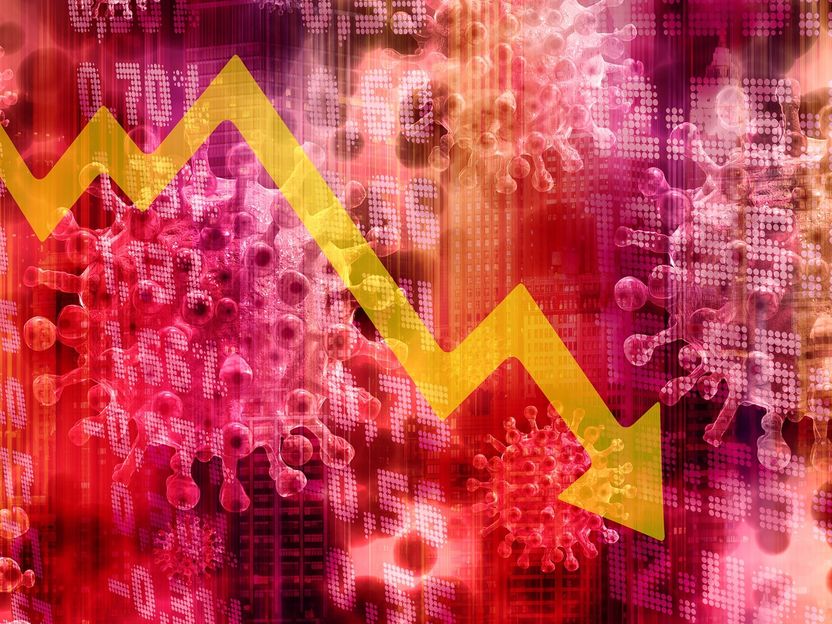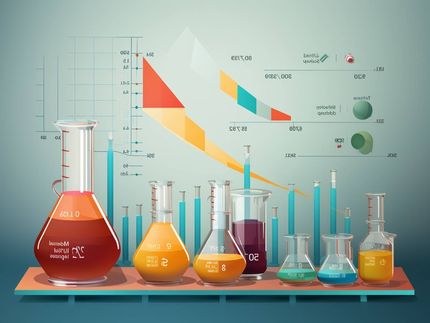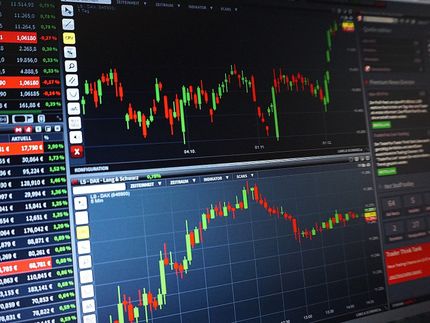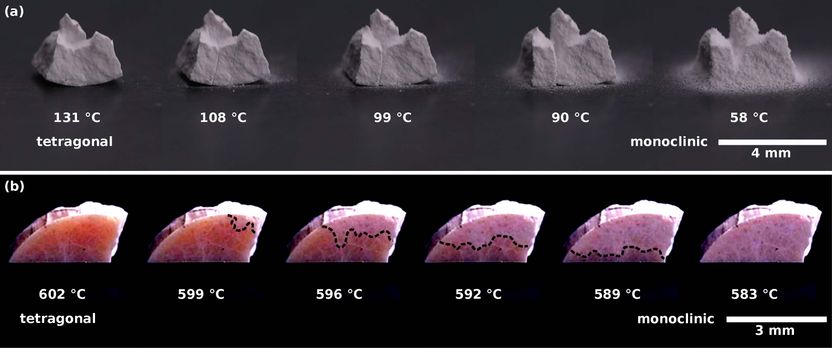BASF: EBIT declines in second quarter due to weaker demand as a result of the corona pandemic
For the third quarter, BASF does not expect EBIT before special items to improve significantly
As expected, the economic effects of the corona pandemic had a much stronger impact in the second quarter of 2020 than in the first quarter of this year. Customer industries were affected to varying degrees: BASF was particularly negatively impacted by the collapse in demand from the automotive industry, while demand from the detergent and cleaner industry and the food industry was stable. BASF was able to continue production at all important sites worldwide.

Symbolic image
geralt, pixabay.com
“The corona pandemic is still a huge challenge for all of us,” said Dr. Martin Brudermüller, Chairman of the Board of Executive Directors of BASF, who presented the second-quarter figures together with Chief Financial Officer Dr. Hans-Ulrich Engel. Brudermüller also sees opportunities: “This situation is a catalyst for change and a chance to do many things differently. At BASF, we have quickly adapted to new processes. Everyone is very open to virtual communication, internally and with our customers.” According to the CEO, BASF is able in times like these to build on its many strengths: flexible and motivated employees, a diversified portfolio and the company’s solid financials.
Given the continued high level of uncertainty and low visibility surrounding economic developments, BASF still does not make any concrete statements on the development of sales and earnings for the full year 2020. For the third quarter, BASF does not expect EBIT before special items to improve significantly compared with the second quarter of 2020, in part due to the generally lower demand in August and the seasonality of the Agricultural Solutions business.
BASF Group’s economic performance in the second quarter 2020
Sales in the second quarter decreased by 12 percent to €12.7 billion. This was primarily attributable to lower sales volumes of minus 11 percent. Prices decreased by 1 percent, mainly due to lower prices for upstream chemicals. Considerably higher prices in the Surface Technologies segment and slightly higher prices in the Agricultural Solutions segment could only partially offset this. Prices in the Surface Technologies segment were supported by higher prices for precious metals in the Catalysts division. Portfolio effects contributed plus 1 percent and were mainly related to the acquisition of Solvay’s polyamide business. Currency effects amounted to minus 1 percent. The devaluation of the Brazilian real and the Argentinian peso were the main reasons here.
Income from operations (EBIT) before special items came in at €226 million, 77 percent below the level of the second quarter of 2019. With the exceptions of Nutrition & Care and Other, which increased earnings, and Agricultural Solutions, where earnings nearly matched the level of the prior-year quarter, all other segments posted lower earnings. This was the result of the pronounced drop in demand in most of BASF’s customer industries. The Chemicals and the Materials segments accounted for 70 percent of the earnings decline.
Special items in EBIT amounted to minus €167 million, compared with minus €488 million in the second quarter of 2019. Special charges were, for example, related to the carve-out of the pigments business and BASF’s “Helping Hands” coronavirus aid campaign. In the prior-year quarter, special charges were mainly caused by one-time costs for the excellence program and the impairment of a natural gas-based investment on the U.S. Gulf Coast. In the second quarter of 2020, EBIT thus decreased by 88 percent to €59 million.
Net income amounted to minus €878 million compared to almost €6 billion in the second quarter of 2019. In the second quarter of 2020, BASF incurred a non-cash-effective impairment of its shareholding in Wintershall Dea. Lower long-term scenarios for oil and gas prices and changed reserve estimates resulted in an impairment of €819 million. In the prior-year quarter, net income included a book gain of €5.7 billion on the deconsolidation of Wintershall.
Cash flows from operating activities increased from €1.9 billion to €2.2 billion in the second quarter of 2020. The increase was primarily due to cash released from net working capital, which rose by €336 million. Free cash flow rose by more than €500 million compared with the second quarter of 2019 and amounted to €1.5 billion.
Development of BASF’s segments in the second quarter 2020
Sales in the Chemicals segment amounted to €1.8 billion. Sales declined considerably compared with the second quarter of 2019 in both divisions, but especially in the Petrochemicals division. The sales decrease was primarily the result of significantly lower prices in both divisions. In the Petrochemicals division, the decrease in prices was largely due to higher product availability on the market and lower raw materials prices. The lower prices in the Intermediates division mainly reflected continued weak demand. By contrast, sales volumes increased in the Chemicals segment thanks to the positive development of volumes in the Petrochemicals division.
At minus €2 million, EBIT before special items was considerably below the level of the prior-year quarter. The considerable decrease affected both divisions, but in particular the Intermediates division. Here, the decline in earnings was primarily due to lower volumes and higher fixed costs, primarily as a result of the gradual startup of the new acetylene plant in Ludwigshafen, Germany. Higher margins on the back of lower raw materials prices had an offsetting effect and led overall to positive EBIT before special items in the Intermediates division. EBIT before special items declined in the Petrochemicals division, mainly due to scheduled turnarounds in Nanjing, China, and lower margins. In addition, an unscheduled turnaround occurred in June at the steam cracker in Port Arthur, Texas.
In the Materials segment, sales of €2.1 billion were considerably below the level of the second quarter of 2019. Sales development was primarily driven by significantly lower volumes in both divisions due to the effects of the corona pandemic, especially in the Performance Materials division. The decrease in sales volumes here was largely attributable to much weaker demand from the automotive industry. Volumes also declined in the consumer goods and construction industries. In the Monomers division, volumes declined for isocyanates in particular. Significantly lower price levels for isocyanates and polyamides in the Monomers division also contributed to the sales decrease. Prices were slightly lower in the Performance Materials division. Sales in both divisions were positively impacted by portfolio effects from the acquisition of Solvay’s integrated polyamide business. Currency effects were negative.
At minus €80 million, EBIT before special items declined considerably in both divisions compared with the prior-year quarter, especially in the Monomers division. This was primarily due to lower isocyanate margins on the back of weak demand. EBIT before special items in the Performance Materials division also declined considerably, mainly as a result of lower volumes.
In the Industrial Solutions segment, sales in both divisions declined considerably compared with the prior-year quarter to €1.8 billion in total. The decrease was primarily due to significantly lower volumes in both divisions. The development of sales volumes in the Performance Chemicals division was negatively impacted by weak demand, especially in the fuel and lubricant solutions and oilfield chemicals businesses. In the Dispersions & Pigments division, higher semiconductor volumes in the electronic materials business were unable to offset lower volumes in all other business areas. Slightly lower prices in both divisions, but especially in the Dispersions & Pigments division, also contributed to the sales decrease. Price levels declined, mainly due to lower raw materials prices.
EBIT before special items was €163 million and decreased considerably compared with the prior-year quarter in both divisions. This was mainly driven by the development of volumes. Slightly lower fixed costs had an offsetting effect in both divisions.
In the Surface Technologies segment, sales declined slightly to €3.1 billion due to a considerable sales decrease in the Coatings division. By contrast, BASF considerably increased sales in the Catalysts division. The sales development was primarily driven by significantly lower sales volumes in both divisions. This was due to weak demand from the automotive industry owing to the effects of the corona pandemic. Lower volumes, especially for mobile emissions catalysts, in precious metal trading and for refining catalysts, reduced sales in the Catalysts division. In the Coatings division, volumes declined in all business areas. Significantly higher prices overall as a result of higher precious metal prices in the Catalysts division had an offsetting effect. In precious metal trading, sales rose to €1.5 billion due to higher prices (prior-year quarter: €1.1 billion). Prices rose slightly in the Coatings division, mainly in the decorative paints and surface treatments businesses.
EBIT before special items of minus €151 million was considerably below the level of the prior-year quarter in both divisions. This was largely driven by the development of sales volumes in both divisions.
Compared with the second quarter of 2019, BASF slightly increased sales in the Nutrition & Care segment to €1.6 billion. This was driven by considerable sales growth in the Nutrition & Health division, while sales in the Care Chemicals division were on a level with the prior-year quarter. The slight sales increase was primarily due to higher volumes in both divisions. The significant volumes growth in the Nutrition & Health division was mainly attributable to the aroma ingredients, pharmaceutical and human nutrition businesses. Sales volumes rose slightly in the Care Chemicals division. Higher volumes in the home care, industrial and institutional cleaning and industrial formulators business, as well as in the oleo surfactants and alcohols business contributed to sales growth. Negative currency effects, especially in South America, partially offset this increase. Sales were also negatively impacted by a slightly lower price level.
EBIT before special items increased considerably compared with the prior-year quarter to €256 million, thanks to a significantly higher contribution from the Nutrition & Health division. This was primarily due to higher margins resulting from higher volumes and prices. EBIT before special items in the Care Chemicals division declined slightly, mainly from higher fixed costs due to a one-off contractual payment in the prior-year quarter.
Sales of approximately €1.8 billion in the Agricultural Solutions segment were slightly below the level of the second quarter of 2019. This was mainly attributable to negative currency effects, especially in the region South America, Africa, Middle East. Higher volumes in all regions except Europe and higher price levels had a positive impact on sales.
At €120 million, EBIT before special items almost matched the level of the prior-year quarter. EBIT before special items was negatively impacted by currency effects and an unfavorable product mix. This was almost offset by significantly lower fixed costs. EBIT included special items for the integration of the businesses acquired from Bayer; these were lower than in the prior-year quarter.
Sales of €507 million in Other were considerably lower compared with the prior-year quarter. This primarily reflected the decrease in commodity trading and in the remaining activities of the paper and water chemicals business. EBIT before special items of minus €80 million in Other was considerably above the figure for the prior-year quarter.




























































